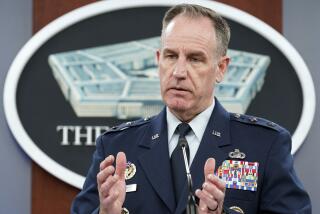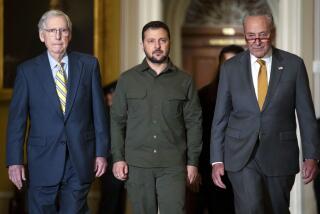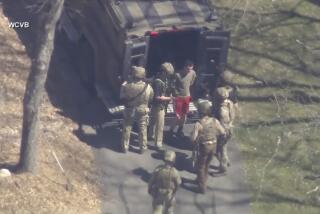Officials Investigating Whether U.S. Loans Helped Buy Iraqi Arms
- Share via
WASHINGTON — Authorities are investigating allegations that Iraq traded grain shipments bought with U.S. government loans for weapons and other military goods, a Bush Administration official confirmed Friday.
The disclosure by Alan C. Raul, general counsel at the Agriculture Department, marked the first official acknowledgment that American foodstuffs may have been exchanged for weapons by Iraq.
In response to a question at a congressional hearing, Raul said an extensive investigation is under way by the Justice Department, his department’s inspector general’s office and other agencies. But he said no evidence of an exchange has been discovered to date.
Sources close to the inquiry say investigators are concentrating on the role played in the alleged diversions by the Atlanta branch of Italy’s Banca Nazionale del Lavoro. The goods were bought with loans guaranteed by the Agriculture Department’s Commodity Credit Corp.
Secretary of State James A. Baker III and other Administration officials were warned in the fall of 1989 that CCC goods were being diverted by Iraq to buy weapons, including nuclear technology. The Administration still approved another $1 billion in CCC aid after Baker lobbied the Agriculture Department and other federal agencies opposed to the assistance.
Last week, Deputy Secretary of State Lawrence S. Eagleburger defended the additional aid, telling Congress there was no proof in 1989 or today that such diversions occurred.
Raul’s remarks came at a hearing of the House Banking, Finance and Urban Affairs Committee that was marked by intensely partisan bickering. At one point, Chairman Henry B. Gonzalez (D-Tex.) banged his gavel repeatedly to stop a heated exchange.
“This is a political charade,” charged Rep. Toby Roth (R-Wis.). “You guys just want to beat up on George Bush.”
“I want to thank Mr. Roth for showing me the depths of political cynicism that some otherwise fine, intelligent people can go to to defend the Administration,” fired back Rep. James P. Moran Jr. (D-Va.).
The raw political tone was heightened by an impending hearing Tuesday by the House Judiciary Committee on whether to request an independent counsel to investigate the Administration’s policy toward Iraq.
One issue the Democrats plan to ask an independent counsel to investigate is the deletion of military designations from items on a list of export licenses for Iraq that was sent to Congress early in 1991 by the Commerce Department. The deletions, which some Democrats say could constitute a criminal offense, meant that Congress did not get an accurate picture of items licensed for sale to Iraq.
At Friday’s hearing, Wendell L. Wilkie II, the Agriculture Department’s general counsel, said the alterations were authorized by Dennis E. Kloske, undersecretary of commerce for exports at the time. Wilkie said former Commerce Secretary Robert A. Mosbacher, now a chief campaign aide to President Bush, was aware of the changes.
Kloske was forced out of his job in April, 1991, after telling Congress that the White House had thwarted his attempts to restrict the sale of sensitive technology to Iraq in the spring of 1990.
A woman who answered the telephone at Kloske’s home said he was out of the country.
Democrats said altering the list was only one way in which the Administration has blocked congressional investigations of its Iraq policy. Allan I. Mendelowitz, a senior official of the General Accounting Office, an investigative arm of Congress, testified that his efforts to examine Iraq-related issues have met with unusual resistance from the Administration.
But eight Administration lawyers denied the accusations and said their agencies had provided congressional committees with thousands of sensitive documents.
Republicans and Democrats differed sharply in their interpretation of one of those documents--National Security Directive 26. The top-secret order issued by Bush on Oct. 2, 1989, mandated closer relations with Iraq and authorized sales of non-lethal military goods.
“When you look at NSD 26, you find out it was the Administration’s sole desire and policy to aid and abet Saddam Hussein,” said Rep. Sam Gejdenson (D-Conn.), who released an unclassified copy of the order that had been heavily censored by the White House. “The cop was put in the intersection, and he was waving the sellers on.”
Republicans pointed out that NSD 26 specified that Iraq’s leadership should be warned that it would face economic sanctions if its forces used chemical or biological weapons or violated safeguards against developing nuclear weapons.
Waas is a special correspondent, and Frantz is a Times staff writer.
More to Read
Sign up for Essential California
The most important California stories and recommendations in your inbox every morning.
You may occasionally receive promotional content from the Los Angeles Times.













